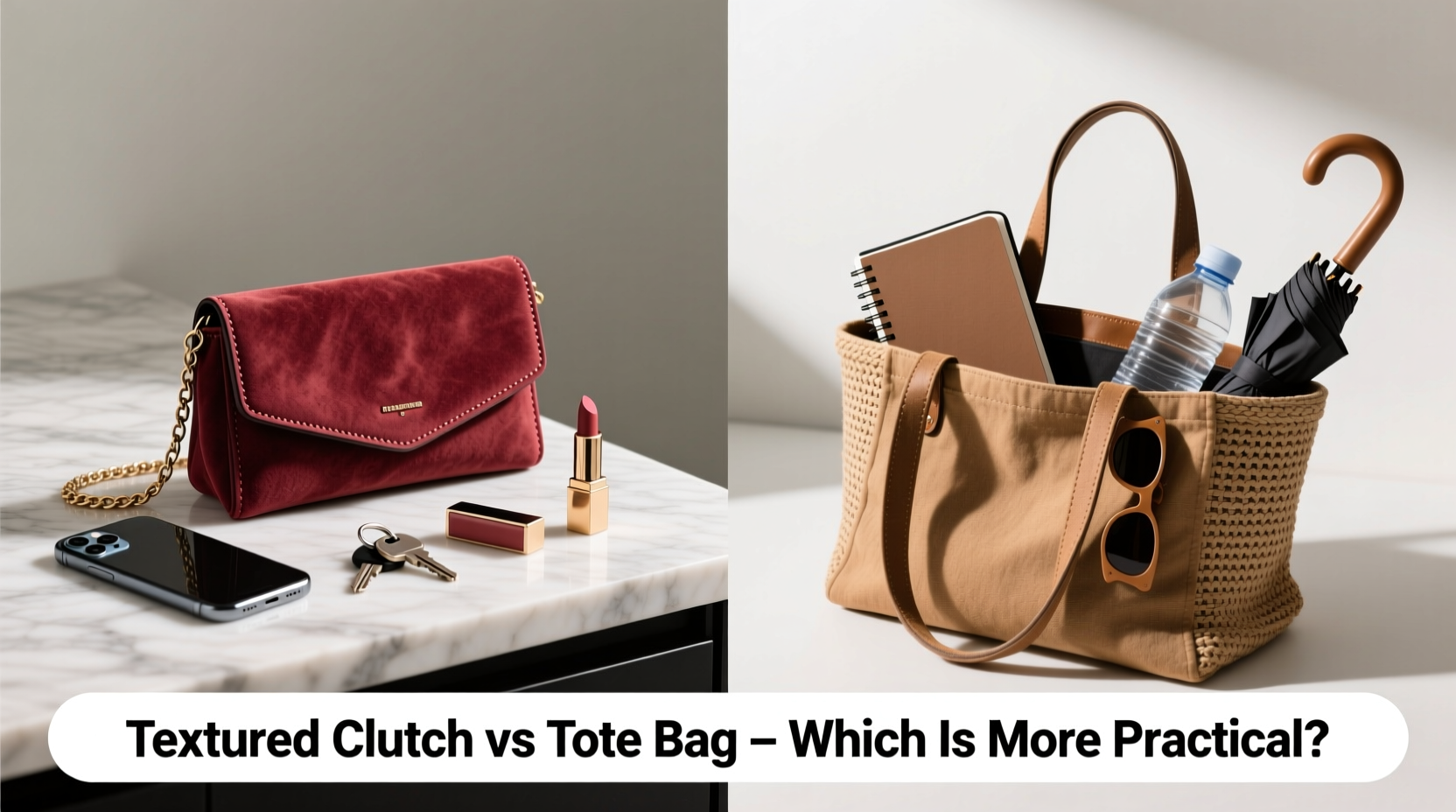Choosing between a textured clutch and a tote bag isn’t just about fashion—it’s a decision that affects how you move through your day. One promises elegance and minimalism; the other, utility and capacity. But when it comes down to daily usefulness, which truly wins? The answer depends on your routine, priorities, and the kind of life you lead. While both have their place in a well-curated wardrobe, understanding their strengths—and limitations—can help you invest wisely and avoid carrying the wrong bag at the wrong time.
Defining the Contenders

A textured clutch is typically a small, handheld bag with a structured or soft exterior featuring tactile finishes like quilted stitching, embossed leather, woven fabric, or pebbled grain. It’s designed for occasions where less is more: evening events, dinners, or minimalist daytime styling. Despite its compact size, the texture adds visual interest and often improves grip and durability.
In contrast, a tote bag is a larger, open-top or zippered carryall with handles long enough for shoulder or hand carrying. Totes are built for function—commuting, work, shopping, or travel. They’re commonly made from canvas, leather, or synthetic blends and frequently feature interior pockets, reinforced bases, and durable stitching.
Core Differences That Matter
The fundamental divergence lies in purpose. Clutches prioritize aesthetics and portability; totes emphasize volume and versatility. A clutch might hold your phone, lipstick, keys, and cardholder. A tote can fit a 13-inch laptop, water bottle, notebook, umbrella, and still have room for a snack. But practicality isn’t only about space—it’s also about comfort, accessibility, and adaptability across scenarios.
Practicality Breakdown: Capacity and Daily Use
When evaluating practicality, start with what you carry regularly. Office workers hauling laptops, notebooks, and chargers will find a clutch insufficient. Even a large clutch rarely exceeds 10 inches in width, limiting bulkier essentials. Totes, however, are engineered for load-bearing. Many include padded laptop sleeves, zip compartments, and key clips—features that prevent clutter and loss.
For urban professionals, parents, or students, the tote is non-negotiable. You can transition from commute to meeting to grocery run without repacking. A clutch requires constant triage: leaving items behind or transferring contents midday, which defeats convenience.
On the flip side, textured clutches shine in situations where excess baggage is impractical. Weddings, cocktail parties, or theater outings demand streamlined accessories. A sleek textured clutch complements formalwear without disrupting silhouettes. In these cases, reducing carried items is part of the dress code.
“Practicality is contextual. A bag that works for brunch won’t serve at a black-tie gala—and vice versa.” — Lena Torres, Fashion Stylist & Wardrobe Consultant
Durability and Maintenance: Texture vs Structure
Texture isn't just decorative—it can enhance resilience. Pebbled leather resists scratches; quilted nylon withstands abrasion. These surfaces hide wear better than smooth finishes, making textured clutches surprisingly durable for their size. However, because they’re often used sparingly and stored carefully, they naturally last longer due to reduced exposure.
Totes face harsher conditions. Dragged on subway floors, stuffed into overhead bins, or left in car trunks, they endure more physical stress. Their larger surface area means more frequent cleaning and higher risk of damage. Yet, many are constructed with reinforced bottoms, double-stitched seams, and water-resistant linings—features absent in most clutches.
Maintenance differs significantly. Clutches require gentle wiping and occasional conditioning. Totes may need deep cleaning, spot treatment, and structural support (like stuffing with tissue) to retain shape when not in use.
Do’s and Don’ts by Bag Type
| Action | Clutch | Tote |
|---|---|---|
| Overstuffing | ❌ Avoid – distorts shape | ⚠️ Moderate risk – check weight limits |
| Exposure to rain | ❌ Keep dry – limited protection | ✅ Use water-resistant models |
| Daily use | ⚠️ Risk of wear – best for special use | ✅ Designed for everyday |
| Cleaning frequency | Monthly wipe-down | Weekly surface clean + monthly deep |
Style Flexibility and Occasion Matching
Stylistically, textured clutches offer high impact with low effort. A metallic crocodile-embossed clutch elevates a little black dress instantly. The texture draws attention, serving as jewelry for your outfit. They’re ideal when your look demands refinement over utility.
Totes, while less flashy, provide long-term versatility. A neutral leather tote pairs with business attire, weekend jeans, and travel outfits. Its consistency makes it a backbone piece. Some luxury totes even appreciate in value if maintained well—unlike clutches, which rarely become collectible unless iconic (e.g., vintage Chanel).
That said, modern design has blurred the lines. Structured mini-totes and clutch-tote hybrids now exist—offering clutch-like elegance with tote-inspired organization. Still, they compromise on full functionality either way.
Real-Life Scenario: Two Days, Two Bags
Consider Sarah, a marketing manager in Chicago. On Monday, she commutes via train, attends four meetings, grabs lunch, and stops at the pharmacy. Her oversized canvas tote holds her laptop, portfolio, lunchbox, and reusable coffee cup. By day’s end, she’s grateful for the hands-free shoulder strap and quick-access pockets.
Friday night, Sarah attends a rooftop wedding. She switches to a rose-gold textured clutch. It carries only her phone, ID, credit card, and lipstick. No room for more—but none is needed. Carrying her tote would look out of place and be cumbersome during dancing.
This illustrates the core truth: neither bag is universally more practical. Context determines utility. Sarah’s lifestyle requires both, used appropriately.
Step-by-Step: Choosing the Right Bag for Your Lifestyle
- Inventory your daily carry items. List everything you take with you regularly—phone, wallet, keys, laptop, makeup, etc.
- Categorize your weekly activities. Note how many days involve work, errands, social events, or travel.
- Match bag size to needs. If more than two days/week require carrying three or more essential items beyond keys and phone, prioritize a tote.
- Assess your storage and rotation habits. Do you own multiple bags? Can you switch based on occasion?
- Test one bag for a week. Try using only a clutch or only a tote for seven days. Note frustrations and conveniences.
- Decide: primary or complementary? Choose the tote as your default if practicality ranks above style. Use the clutch as a situational accessory.
Frequently Asked Questions
Can a textured clutch be practical for everyday use?
Rarely. Unless you carry very few essentials—such as phone, cardholder, and lip balm—a clutch lacks space and comfort for all-day use. Shoulder strain and security concerns (no zippers or straps) make it ill-suited for commuting or errands.
Are tote bags appropriate for formal events?
Generally, no. Large totes disrupt formal silhouettes and appear utilitarian. For upscale events, opt for a structured box bag or textured clutch. Small, refined totes in luxe materials (like satin or polished leather) may work for daytime weddings or garden parties.
How do I make a tote look stylish, not sloppy?
Keep it organized. Use interior pouches for small items. Avoid overfilling. Choose clean lines and neutral colors. A well-maintained tote with minimal hardware projects intentionality, not clutter.
Final Verdict: Which Is More Practical?
If forced to pick one, the **tote bag wins on overall practicality**. It accommodates real-world demands: work, parenting, travel, and errands. It supports an active, multifaceted life. While a textured clutch enhances elegance, it does so at the cost of function.
However, dismissing the clutch entirely ignores the role of context. True practicality includes knowing when to downsize. The most functional wardrobe isn’t one with a single hero bag, but one with the right bag for each moment.
Build a Smarter Bag Rotation
Instead of choosing sides, build a system. Let the tote be your workhorse. Keep a foldable backup tote in your main bag for unexpected shopping. Reserve textured clutches for nights out or minimalist days. Rotate based on schedule, not impulse.
“The most practical woman isn’t the one with the biggest bag—but the one who always has what she needs, exactly when she needs it.” — Marcus Lee, Lifestyle Efficiency Coach
Take Action Today
Open your closet. Pull out every bag you own. Test each one against your typical day. Does it carry your essentials without strain? Does it suit the setting? If not, consider replacing or supplementing it. Start with a durable, mid-sized tote in a neutral tone. Then add one textured clutch that reflects your personal style. From there, expand only when a clear gap appears.









 浙公网安备
33010002000092号
浙公网安备
33010002000092号 浙B2-20120091-4
浙B2-20120091-4
Comments
No comments yet. Why don't you start the discussion?